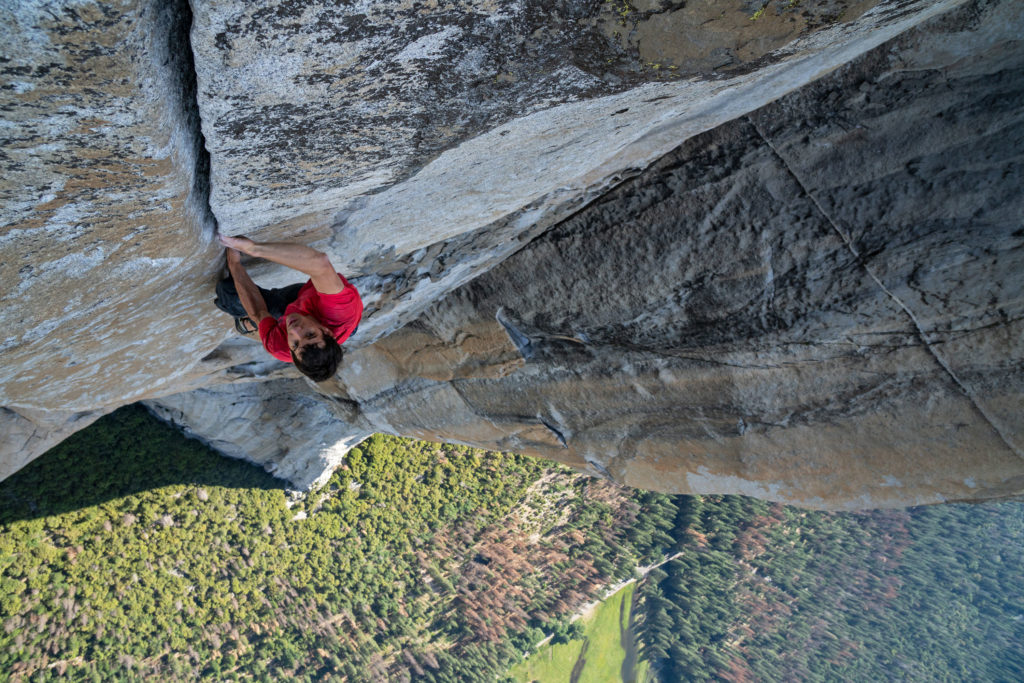Reviews include Deadpool & Wolverine, Doubles, and Mountain Queen: The Summits of Lhakpa Sherpa.
Dances With Death: Free Solo and Sharkwater: Extinction
September 10, 2018
“I have never been to a bullfight…
… and it would be ridiculous of me to claim that the film lets me feel the same emotions, but I do claim that it gives me its essential quality, its metaphysical kernel: death. The tragic ballet of the bullfight turns around the presence and the permanent possibility of death (that of the animal and the man). That is what makes the ring into something more than a theatre stage: Death is played upon it.”

The words of André Bazin have been rattling around my head throughout the 2018 Toronto International Film Festival. Not that death is uncommon at the movies (for instance, the body counts in films like terrorism dramatizations 22 July and Hotel Mumbai are horrifyingly substantial, as are their realities). Rather, following screenings of documentaries Free Solo and Sharkwater: Extinction, reading Bazin’s essay Death Every Afternoon is a way to make sense of two films which exist on a continuum of death and cinema, each of them operating on a precipice of dangerous documentary filmmaking. Despite having two very different outcomes surrounding their main subjects, they feel linked in their fearlessness of death; in essence, cameras are rolling in spite of it.
Free Solo would be a very different film had Alex Honnold, superstar climbing athlete and activist, fallen to his death in scaling Yosemite’s El Capitan without a rope. I imagine there exists a temporary edit of the documentary in the case of such a tragedy, as many of the interviews with friends and family prior to his historic ascent try to get at why Honnold can do what so many people cannot: look down. Sure, as Honnold points out: One could get hit by a bus at any time. And that’d be it. That doesn’t make the act of free soloing any less insane than it already is.

I secreted an absurd amount of sweat through my palms during the 97 minutes of Free Solo. The act of watching the film never really gets easier, even when we already know Honnold made it to the top of El Capitan on June 3rd, 2017. At the base of the mountain are the filmmakers, chewing their fingernails and unable to watch as Honnold surpasses key pitches on the route. The stakes are 2,307 metres high. In a single misstep, previously recorded interviews discussing death can change meaning.
To their credit, the filmmakers frequently address this. The phantom edit of what this movie may have been becomes a lingering spectre, effectively underscoring the documentary’s supreme vertigo. In other words, the edit screening at TIFF seems to revel in what could happen (which, at times, feels somehow disingenuous). Thank goodness it doesn’t. Horror films are defanged when we’re forewarned of certain jump scares, yet Free Solo‘s dance with death is likely more intense than anything else at this festival.
And then there’s Sharkwater: Extinction, a film so married with death its ultimate form is in the very title. An extension of Rob Stewart’s initial Sharkwater film campaign in 2006, Extinction revisits urgent updates to the conservation cause that need some addressing, for example: While stripping the fins off sharks (for an expensive soup) has been banned in dozens of countries (thanks to Sharkwater!), glaring loopholes exist to make importing shark fins in these same countries a relatively easy endeavour. Shark steaks are for purchase at supermarkets in Miami, Florida, as are beauty products and pet foods that have trace amounts of shark DNA in them. Destructive fishing lines exist just off the coast of Los Angeles. The list goes on.

Of course, the film is linked with tragedy, and not simply the scores of sharks mutilated on camera: On January 31st, 2017, sometime in the hours following an underwater shoot for this documentary, Rob Stewart drowned due to an error in his rebreather. If a spectre haunts the shadows of Free Solo, Extinction‘s psychopomp is omnipresent.
The film culminates with Stewart’s final dive, making the act of watching Extinction a bit of an unfortunate waiting game, albeit one that unfolds akin to an exciting spy movie. Intent on revealing the truths of today’s shark trade, Stewart and his co-conspirators use the latest in technology (drones, hidden cameras, underwater aquascooters) to take audiences to the skies and to new depths. The result is as visual as it is heartbreaking, and Stewart’s death is a serious loss (not only to sharks, but to documentary, to Canada, and to conservationists around the world).
Indeed, it’s in Extinction‘s final act that I’m reminded again of Bazin, writing on the repeatable death of Manolete, a matador featured in Myriam Borsoutsky and Pierre Braunberger’s documentary Bullfight (1951).
“In a certain sense, it is even more moving because it magnifies the quality of the original moment through the contrast of it repetition. It confers on it an additional solemnity,” he writes.
To paraphrase Bazin, the cinema — in this case, Sharkwater: Extinction — has given the life of Stewart a material eternity.
— Jake Howell



